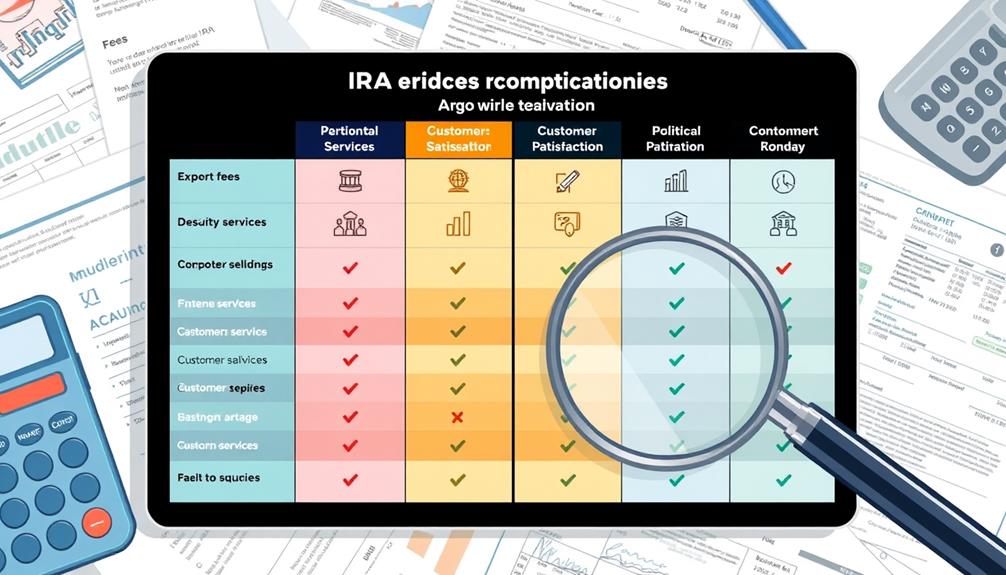Retirement planning in Massachusetts can be made more efficient by integrating IRAs with state-specific benefits effectively. It is important to consider both Traditional and Roth IRAs, as they provide tax-deferred growth and tax-free withdrawals in the case of Roth accounts. While IRA contributions do not qualify for state deductions, Massachusetts offers tax exemptions for certain pension distributions, which can enhance your overall tax strategy. By combining your IRA distributions with pension benefits, you can maximize your retirement income. It is crucial to understand how these accounts interact for a comprehensive plan. Exploring the details of these benefits further can enhance your readiness for retirement.
Key Takeaways
- Combine Traditional and Roth IRAs to maximize tax advantages and enhance retirement savings in Massachusetts.
- Massachusetts offers tax exemptions for certain IRA distributions, improving net retirement income.
- Utilize the CORE Plan for automatic contributions, complementing IRA savings and enhancing retirement security.
- Understand the contribution limits for IRAs to optimize tax-deferred growth and retirement planning.
- Report all pension income accurately on Massachusetts tax forms to benefit from available exclusions.
Overview of Retirement Planning

When you think about retirement planning in Massachusetts, it's important to understand the various options available to you. One key component is individual retirement accounts (IRAs), which allow for tax-free earnings. However, remember that contributions made to IRAs are taxed when contributed, with no state deduction. You can contribute up to $6,500 annually, or $7,500 if you're 50 or older, giving you a chance to save more through tax-deferred growth.
Additionally, Massachusetts provides tax exemptions for certain pension distributions, which can greatly affect your retirement planning. If you have state or local employee pensions, take note of the maximum deduction of $2,000 for contributions made to these plans. This can complement your overall strategy.
It's important to understand that eligible distributions from IRAs and other retirement plans may experience different tax treatments. This variation can impact your financial decisions as you navigate retirement.
Understanding IRAs and Their Benefits

Understanding IRAs is essential for effective retirement planning, as they offer significant tax advantages that can enhance your savings. With individual retirement accounts (IRAs), you can contribute up to $6,500 annually, or $7,500 if you're 50 or older. Depending on your income and participation in employer-sponsored plans, your contributions may be tax-deductible.
Here's a quick comparison of traditional and Roth IRAs:
| Type of IRA | Key Benefits |
|---|---|
| Traditional IRA | Tax-deductible contributions; earnings grow tax-deferred until withdrawal. |
| Roth IRA | Contributions made with after-tax dollars; allows for tax-free withdrawals in retirement. |
In Massachusetts, while contributions to IRAs were previously taxed without deductions, certain distributions are now exempt from state gross income. This makes IRAs even more appealing for your retirement planning. Remember, with both types of IRAs, the earnings on your investments grow tax-deferred until you withdraw, providing a powerful way to accumulate your retirement savings effectively. Choose the IRA that aligns best with your financial strategy to maximize your benefits.
Massachusetts State-Specific Retirement Plans

Massachusetts has implemented specific retirement plans that greatly benefit employees and employers alike. One key program is the CORE Plan, designed for employers with five or more employees who either offer a qualifying 401(k) or automatically enroll their staff in this state-sponsored retirement plan.
With the CORE Plan, you can defer 6% of your pay into a tax-exempt account after just 60 days, and you have the flexibility to adjust your contributions or opt-out.
This initiative has been particularly popular among nonprofits, with over 110 organizations participating and managing assets exceeding $11.7 million as of June 30, 2021. Contributions to these state-specific retirement plans grow tax-free until withdrawal, providing a significant advantage for your savings.
Additionally, Massachusetts offers tax credits under the SECURE Act, encouraging small businesses to implement retirement plans and helping offset costs associated with plan setup and employee contributions.
Tax Treatment of Retirement Accounts

When it comes to retirement accounts in Massachusetts, understanding tax treatment can save you money.
Employee contributions to pensions are tax-exempt, which allows you to defer taxes on those amounts, while IRA contributions have specific implications worth noting.
Knowing how distributions from these accounts are taxed at both state and federal levels can help you plan more effectively for your retirement.
Massachusetts Pension Tax Exemptions
Handling the tax implications of retirement accounts in Massachusetts can greatly affect your financial planning. When considering pension tax exemptions, it's important to understand how different retirement accounts impact your gross income.
For public safety employees, contributions to pensions, like those for police and fire departments, are fully excluded from both federal and state gross income. This means significant tax savings for you.
Massachusetts does allow a maximum deduction of $2,000 for contributions to state and local employee pensions, helping you reduce your taxable income. However, keep in mind that distributions from defined contribution plans, such as 403(b) and 457 plans, are fully taxable, despite contributions and earnings being excluded while in the plan.
While IRA contributions in Massachusetts previously didn't allow for deductions at the time of contribution, they still offer benefits through tax-free earnings and variable distribution taxability.
Understanding these nuances helps you maximize the benefits of your retirement plans. Be certain to factor in these exemptions and deductions as you strategize your retirement savings to guarantee you're making the most of your financial future in Massachusetts.
IRA Contribution Tax Implications
Often overlooked, the tax implications of IRA contributions in Massachusetts can greatly impact your retirement strategy. While you can enjoy tax-free growth on your Individual Retirement Accounts, Massachusetts doesn't allow deductions for these contributions when calculating your state gross income. This means that you won't see a reduction in your state tax bill based on your IRA contributions.
Consider the following points regarding state tax implications:
- The annual contribution limit for IRAs in 2024 is $7,000, or $8,000 for those aged 50 and older, allowing for catch-up contributions.
- Earnings on these contributions grow tax-free until withdrawal, benefiting your long-term savings.
- When you take distributions, they're fully taxable at the federal level, and Massachusetts will also tax these withdrawals.
- This taxation on distributions means you must include them in your state gross income when filing your state tax returns.
Understanding these nuances can help you better navigate your retirement planning and state retirement plans. Be proactive in managing your IRA contributions and distributions to maximize your retirement savings effectively.
Integrating IRAS With Pension Plans

Integrating IRAs with pension plans can greatly enhance your retirement strategy in Massachusetts. By combining these two powerful tools, you can maximize your retirement savings and take advantage of various tax benefits.
While contributions to IRAs aren't tax-deductible for state income tax purposes, they still grow tax-deferred, allowing your investments to compound more effectively over time. For 2024, you can contribute up to $7,000 to your IRA if you're under 50, or $8,000 if you're 50 or older, promoting additional retirement savings alongside your pension plan.
Moreover, Massachusetts residents can receive a maximum deduction of $2,000 for contributions to state and local employee pensions, enhancing the overall tax efficiency of your retirement accounts.
It's essential to take into account the tax implications of distributions from your IRAs, which are subject to state income tax, unlike some pension distributions that may be excluded from gross income. Effective financial planning involves understanding how these elements interact, allowing you to create a balanced strategy that leverages the strengths of both IRAs and pension plans for a secure retirement.
Key Features of the CORE Plan

The CORE Plan is designed to help you save for retirement with features similar to a 401(k).
You'll automatically contribute 6% of your pay after 60 days, and you can choose a Roth option for tax-free withdrawals later.
Understanding the contribution and distribution rules is essential to making the most of this plan.
CORE Plan Overview
With over 110 nonprofits participating, the CORE Plan offers a robust 401(k) retirement option for employees in Massachusetts. This plan is designed to help you build your retirement savings through tax-deferred contributions, allowing you to lower your taxable income while you save.
You also have the option to choose a Roth account within the CORE Plan, which enables you to make tax-free withdrawals after retirement, provided you meet certain conditions.
Here are some key features of the CORE Plan:
- Ease of Administration: The Commonwealth of Massachusetts administers the CORE Plan, alleviating administrative burdens for nonprofits and ensuring a seamless experience for employers.
- Widespread Adoption: As of mid-2021, the CORE Plan covered over 700 employees across numerous small organizations, showcasing its popularity.
- Total Assets Growth: The plan's total assets exceeded $11.7 million, reflecting the importance of employee contributions in building robust retirement savings.
- Enhanced Retirement Benefits: The CORE Plan provides valuable retirement benefits that align with the financial goals of employees working in the nonprofit sector.
This combination of features makes the CORE Plan a compelling choice for your retirement planning.
Contribution and Distribution Rules
Understanding the contribution and distribution rules of the CORE Plan is essential for maximizing your retirement savings. This retirement savings program, available to employees of participating nonprofits in Massachusetts, offers a structured way to save through tax-deferred contributions.
When you join the CORE Plan, you're automatically enrolled with a default contribution rate of 6% of your pay after 60 days. Of course, you can adjust your contributions or opt-out entirely if you prefer.
One of the standout features of the CORE Plan is the Roth option. This allows you to make after-tax contributions, giving you the potential for tax-free withdrawals in retirement, provided you meet certain conditions. This flexibility can be a game-changer for your employee retirement strategy.
Employers aren't required to offer the CORE Plan, but many nonprofits choose to do so, recognizing its value in promoting flexible retirement savings options.
As of June 30, 2021, over 110 nonprofits had adopted the CORE Plan, collectively managing more than $11.7 million in assets and covering over 700 employees. Taking advantage of these rules can greatly enhance your approach to retirement planning.
Compliance Requirements for Employers

Employers in Massachusetts must navigate specific compliance requirements to meet state-mandated retirement plan obligations. If you have five or more employees, you're required to register for a retirement plan, such as the CORE Plan, which features automatic enrollment.
After 60 days, a six percent payroll deduction applies to participating employees.
Here are key compliance considerations for you:
- Registration: Confirm you're registered for state-sponsored retirement plans or offer qualifying alternatives like 401(k) plans.
- Penalties: Be aware that non-compliance can lead to fines ranging from $20 to $500 per employee, depending on the specific regulations.
- Tax Credits: Take advantage of tax credits under the SECURE Act when initiating a retirement plan, which can incentivize employee savings.
- Employee Communication: Clearly communicate the retirement plan details to your employees to guarantee their understanding and participation.
Managing Contributions and Distributions

Managing contributions and distributions effectively is essential for maximizing retirement savings in Massachusetts. When you contribute to an IRA, remember that while your contributions aren't tax-deductible in the state, they do allow for tax-free earnings. For 2023, you can contribute up to $6,500, or $7,500 if you're 50 or older.
Additionally, exploring options like a Gold IRA can diversify your investment portfolio and potentially offer greater returns. However, this strategic planning is imperative since IRA distributions are fully taxable at both the state and federal levels upon withdrawal.
Unlike employee pensions, where contributions can provide immediate tax relief, your IRA contributions won't offer you that benefit in Massachusetts. You can claim a maximum deduction of $2,000 for contributions to state and local employee pensions, but this doesn't extend to your IRAs.
As a result, it's important to reflect on how these factors impact your overall retirement savings strategy. Be mindful of the tax implications of your distributions as they can greatly affect your financial situation in retirement.
Balancing your IRA contributions with other retirement accounts, such as 403(b) plans, which allow for tax-deferred growth, can enhance your financial security and help you make the most of your state-specific benefits.
Reporting Requirements for Residents

When you're a resident of Massachusetts, it's crucial to know the reporting requirements for your retirement income. You must report all pension income on Massachusetts Form 1, specifically on Line 4.
Be aware that government pension income might qualify for exclusions depending on how other states treat it. Additionally, you can use Schedule Y (Line 13) to exclude pension income if you meet specific eligibility criteria.
Here's what you need to keep in mind:
- All pension distributions from retirement plans are included in your federal gross income.
- Massachusetts allows a maximum deduction of $2,000 for contributions to state and local employee pensions on your tax returns.
- If you're a part-year resident, report government pension income on MA Form 1-NR/PY (Line 6) for the duration of your residency.
Understanding these state-specific benefits can help you optimize your retirement planning.
Resources for Retirement Planning

As you navigate your retirement planning in Massachusetts, it's essential to tap into the resources available to help you make informed decisions. The Massachusetts Department of Revenue is an excellent starting point, providing guidance on integrating IRAs with state-specific retirement benefits. You can learn about tax-free earnings on IRA contributions and the annual contribution limits of $7,000, plus an additional $1,000 catch-up contribution for those aged 50 and over.
Here's a quick overview of the key resources:
| Resource | Description |
|---|---|
| Department of Revenue | Guidance on tax treatments and reporting requirements |
| IRA Contribution Limits | $7,000 annual limit, $1,000 catch-up for 50+ |
| Deduction for Contributions | Up to $2,000 for qualified retirement accounts |
| Tax-Free Earnings | Understanding tax-free benefits on IRAs |
| Retirement Benefits Overview | extensive state-specific retirement savings info |
Frequently Asked Questions
What Is the Massachusetts State Retirement Plan?
The Massachusetts State Retirement Plan provides a defined benefit pension for state employees, ensuring retirement income based on service years and final salary. You contribute a portion of your salary, benefiting from tax exemptions on pension income.
Does Massachusetts Have State Income Tax on Retirement Income?
Yes, Massachusetts does tax certain retirement incomes. However, public safety pensions and specific military benefits aren't taxed. You'll want to understand how different income sources affect your overall tax situation when planning retirement.
Can You Collect Social Security and a State Pension in Massachusetts?
Yes, you can collect both Social Security and a state pension in Massachusetts without any reduction in benefits. This combination allows you to maximize your retirement income while enjoying the state's favorable tax treatment.
What Is the Double Dipping Law in Massachusetts?
In Massachusetts, the Double Dipping Law prevents you from collecting a pension and salary simultaneously in public positions. While it protects pension systems, some exceptions allow limited employment without jeopardizing your benefits.
Conclusion
As you navigate your retirement journey in Massachusetts, picture a garden where your IRAs and state-specific benefits bloom together. By understanding how to integrate these elements, you're not just planting seeds for your future—you're cultivating a vibrant landscape of financial security. Keep an eye on compliance and tax treatments, ensuring that every contribution and distribution nourishes your retirement plan. With the right resources at hand, you can watch your retirement dreams flourish like a well-tended garden.









